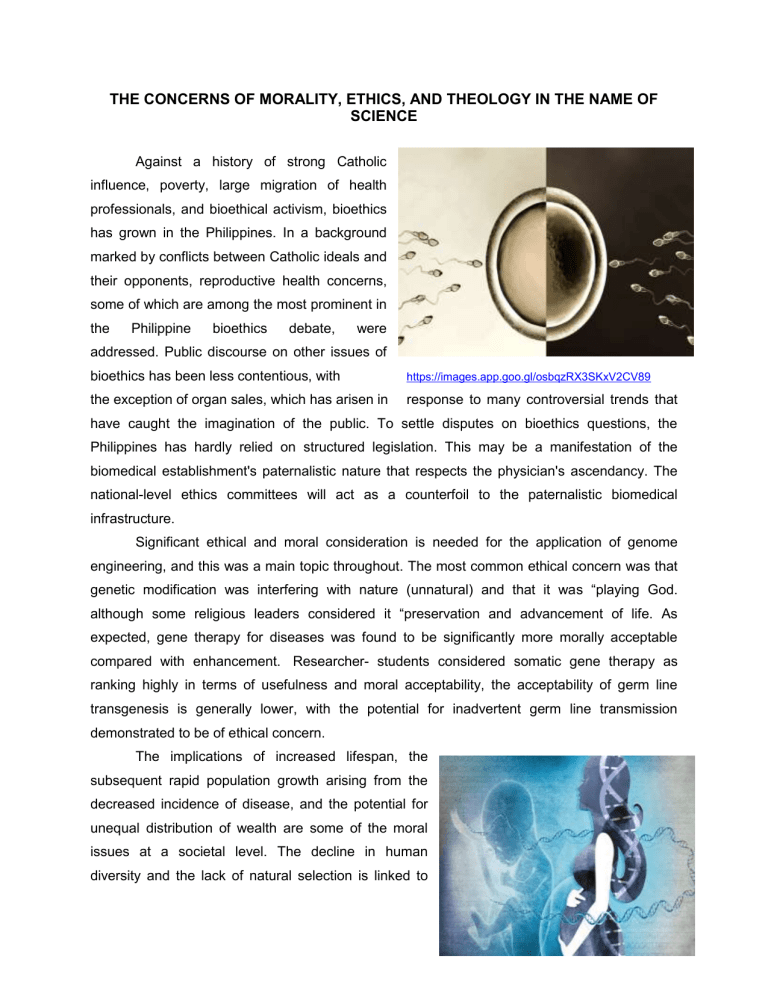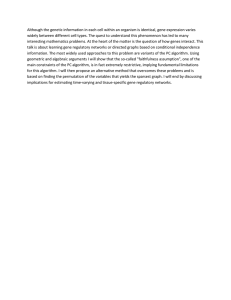
THE CONCERNS OF MORALITY, ETHICS, AND THEOLOGY IN THE NAME OF SCIENCE Against a history of strong Catholic influence, poverty, large migration of health professionals, and bioethical activism, bioethics has grown in the Philippines. In a background marked by conflicts between Catholic ideals and their opponents, reproductive health concerns, some of which are among the most prominent in the Philippine bioethics debate, were addressed. Public discourse on other issues of bioethics has been less contentious, with https://images.app.goo.gl/osbqzRX3SKxV2CV89 the exception of organ sales, which has arisen in response to many controversial trends that have caught the imagination of the public. To settle disputes on bioethics questions, the Philippines has hardly relied on structured legislation. This may be a manifestation of the biomedical establishment's paternalistic nature that respects the physician's ascendancy. The national-level ethics committees will act as a counterfoil to the paternalistic biomedical infrastructure. Significant ethical and moral consideration is needed for the application of genome engineering, and this was a main topic throughout. The most common ethical concern was that genetic modification was interfering with nature (unnatural) and that it was “playing God. although some religious leaders considered it “preservation and advancement of life. As expected, gene therapy for diseases was found to be significantly more morally acceptable compared with enhancement. Researcher- students considered somatic gene therapy as ranking highly in terms of usefulness and moral acceptability, the acceptability of germ line transgenesis is generally lower, with the potential for inadvertent germ line transmission demonstrated to be of ethical concern. The implications of increased lifespan, the subsequent rapid population growth arising from the decreased incidence of disease, and the potential for unequal distribution of wealth are some of the moral issues at a societal level. The decline in human diversity and the lack of natural selection is linked to more ethical concerns. Techniques that are perceived to be slightly less dangerous are considered to be more "morally acceptable" and "useful to society." Other moral factors included the idea that if people https://images.app.goo.gl/kbBHsLrbqJqLYQni7 use gene therapy for improvements, natural abilities will not be exceptional and could even endanger the dignity of the human race. As a result of gene therapy, there may also be a risk of losing a sense of self (personal identity), particularly in the context of brain gene therapy, or changes in sexual orientation. Those not opposed to germ line transgenesis for enhanced intelligence, on the other hand suggested that it would encourage users to contribute more to society, and they were worried that they would fall behind if others introduced its use first. Many doubts and worries have been followed by an underlying lack of confidence. The emphasis of these issues was on mistrust of science, scientists, the medical system, government and and the those rules in of power. Determined that respondents were most trusted for regulatory control by international regulatory bodies such as the World Health Organization, while science organizations and ethics committees were considered less favorable. In terms of faith, from https://images.app.goo.gl/ewYXcgqVdnhbRqkVA a legislative viewpoint, religious groups, trade unions, and political parties scored lower still. Scientists expressed trust concerns around technique management to ensure security from misuse, leaving space for improvement and enhancement. REFERENCES: Delhove J., Osenk I., Prichard I., and Donnelley M. (2020). Public Acceptability of Gene Therapy and Gene Editing for Human Use: A Systematic Review. Retrieved from https://www.liebertpub.com/doi/full/10.1089/hum.2019.197 De Castro L. and Toledano S. (2013). Philippines. Retrieved from https://link.springer.com/referenceworkentry/10.1007%2F978-94-007-2512-6_44 MedlinePlus. (n.d.). Help Me Understand Genetics Gene Therapy. Retrieved from The Basics of Gene Therapy.pdf

